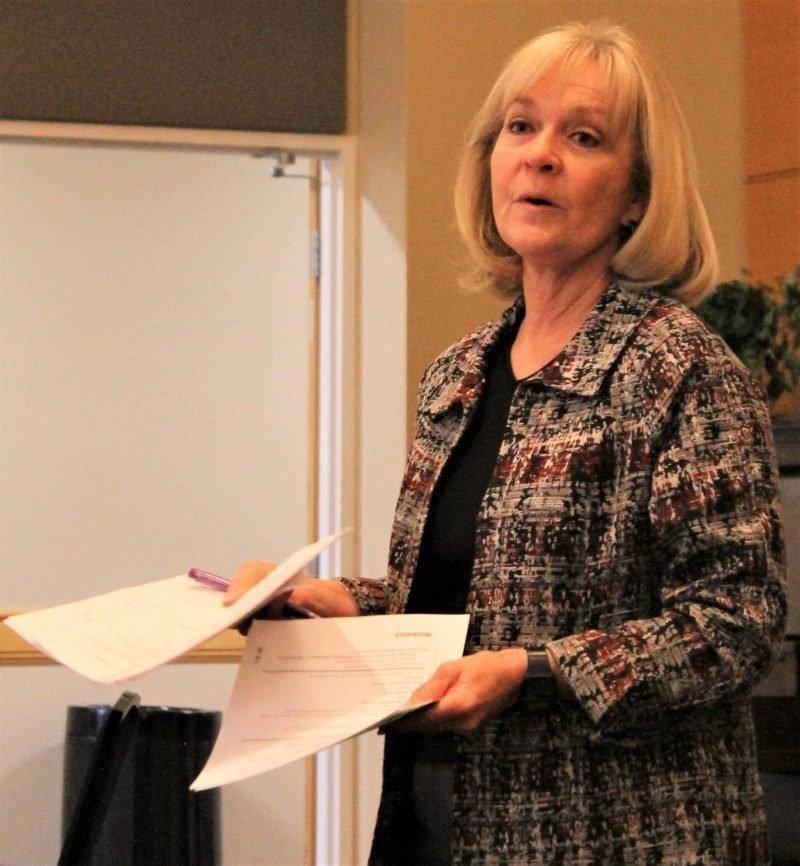Christine Watkins talks about what went on in the legislature last year during a presentation at a BEAR meeting.
BEAR Press Release
For a number of years, the funding for the Business Expansion and Retention programs in Utah has relied on numbers that were not very solid. Funding for the program in most counties came from the Industrial Assistance Fund, which is a large fund that is used to assist many kinds of programs across the state. The problem was that BEAR managers never knew what kind of funding they would get each year. More importantly, they didn’t even know what the floor, or the lowest point of funding, might be in any cycle.
Last week, Governor Gary Herbert signed a bill that changed all that. HB 212, which was introduced by Representative Christine Watkins, District 69, in the last legislative session is meant to solve that problem as well as other difficulties that BEAR programs have been experiencing. The bill was supported in the Senate by David Hinkins, District 27.
“By doing this, we went into new territory on the programs it supports,” said Watkins last week.
Two of the things that the IAF supports strongly in rural areas such as in Castle Country and the Uintah Basin are the Fast Track Grant program ($1.5 million appropriated for its floor this year) and the BEAR assistance fund (with a floor of $350,000 included in this year’s legislation).
The Fast Track Grant program, which works with matching grants, allows businesses to get up to $50,000 in a grant for expansion of their operations. Last year, for instance, BEAR helped local economic directors in Castle Country to identify and aide businesses in securing Fast Track Grants to the tune of $250,000. The grants are a brick and mortar programs that award certain types of businesses money for either upgrading equipment or buildings for business expansion.
However, the IAF fund as a whole is not fixed in place either, and Watkin’s said that will be something she wants to work on in the future.
“While the IAF is good for this year, that might not always be the case,” said Watkins. “So, next year, I would like to work on getting that solidified.”
BEAR program administrators are very happy about the bill finally getting the governor’s signature.
“We work hard to help businesses to achieve more in the Castle Country area,” said Castle Country BEAR Board Chair Karl Kraync. “There are a lot things we can do from helping businesses to get to the right people for grants, to working with other possible financial partners. We also run programs to help businesses in the area in other ways. This development is good news for us and the businesses we work with.”
In the Uintah Basin, BEAR operates differently from in Castle Country, but the goals are the same and the IAF funding supports it as well. The organization has made a real difference in the two-county area.
“We have worked a lot with businesses here in the Basin,” said Dorothy Carter, who has been working with the program since last year. “We have been working with the oil and gas companies and other businesses as well as working with the Duchesne area to start a business alliance. I work with both counties through the BEAR grant and we work to find businesses who need help and find solutions to solve those things.”
Just recently, Uintah Basin BEAR had an eight-hour marketing training in Vernal that drew people from as far away as Hannah.
Both BEAR organizations work to provided assistance to their businesses in various ways.
Watkins went on to say that one of the other things the new bill is going to help with is communication.
“I found that the Governor’s Office of Economic Development (GOED, the agency that administers the money) was not in communication with the Governor’s Rural Partnership Board the way they should be, and the bill will help with that as well,” explained Watkins. “I realized there had been a real disconnect between the two and that communication is important.”
The bill also kept the previous definitions of what rural communities consist of, which is good because sometimes, if the definitions are not tight enough, available money that is meant for one area or thing can be drawn off into other places in the state.
Watkins said any kind of measure like this is never set in stone from year to year, and that having institutional memory about what has gone on in the past is really important.
“It is important that whoever sits in this seat watches what is going on because state government evolves and sometimes things get changed because no one remembers the reason it was done,” she said. “I was out of the legislature for four years and when I came back I was amazed at the things that we had to deal with that I remembered dealing with before I left that had been changed. That institutional memory is important to a legislative seat. It would be very easy to lose what we have gained through this legislation.”
The new funding cycle for BEAR in all areas of the state will begin July 1.

